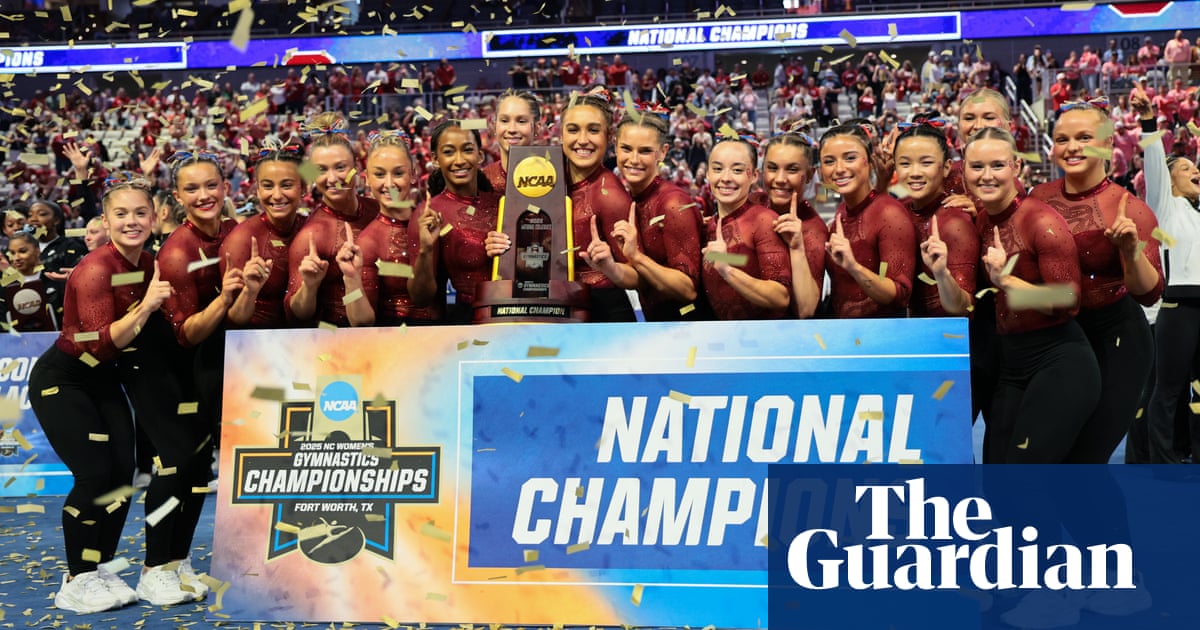Audrey Davis delivered a 9.9250 on the uneven bars in the final rotation and Jordan Bowers followed with a 9.8875 to help Oklahoma secure their seventh NCAA women’s gymnastics championship on Saturday at Dickies Arena.
The Sooners, who have now won six titles since 2016 under head coach KJ Kindler, finished with 198.0125 points – pulling away from UCLA in the final rotations. The Bruins, led by Olympic champion Jordan Chiles, placed second with 197.6125. Missouri (197.2500) finished third in its first appearance in the final, while Utah (197.2375) was fourth.
The championship was Oklahoma’s third in the last four seasons and its 11th appearance in the final round over the last 13 years.
Oklahoma and UCLA were tied after the opening rotation, with the Sooners posting a 49.615 on beam – their strongest event – and the Bruins matching that total on floor. Chiles received three perfect 10s from six judges for a 9.9750 routine that anchored the Bruins’ floor lineup.
Oklahoma gained separation in the second and third rotations, highlighted by Faith Torrez’s 9.9625 on floor and her 9.9375 on vault. Davis and Bowers closed it out on bars to seal the Sooners’ latest title.
Bowers also won the individual all-around title earlier in the week. “Last year was a tough loss,” she said during the ABC broadcast. “But we’ve grown from that, and this was the ending we dreamed of.”
Chiles finished with a meet-high 39.7750 all-around score and won the NCAA title on uneven bars Thursday night – her second national crown on the event. Her teammate Brooklyn Moors claimed the floor title.
Missouri’s Helen Hu captured the beam title after helping the Tigers qualify for their first-ever championship final with a clutch semifinal performance. LSU freshman Kailin Chio won the vault title, though the defending national champions did not advance to Saturday’s final after finishing third in the semifinal round.
Utah, making their fifth consecutive Final Four appearance, was hampered by a fall from All-American Grace McCallum on beam. The Utes, who have won nine national championships – the most in NCAA history – have not claimed the title since 1995.
UCLA, in their first year as a Big Ten program, came within four tenths of their first championship in seven years. The Bruins finished strong with 9.9250 and 9.9375 on beam from seniors Emily Lee and Emma Malabuyo, but couldn’t close the gap.
“It stings,” said UCLA coach Janelle McDonald. “But this group brought us back to the top of the sport, and they’ve laid a foundation for what’s next.”
Michigan reclaimed NCAA men’s gymnastics supremacy, capturing their first national title since 2014 by edging five-time defending champion Stanford in a dramatic finish. The Wolverines totaled 422.224 points – just ahead of Stanford’s 422.196 – with Olympic bronze medalists Fred Richard and Paul Juda going 1-2 in the all-around to lead the charge.
Juda clinched the victory with a 13.966 on vault, capping a day that also saw him win the parallel bars title with a 14.200. Michigan, who finished second to Stanford in 2024 by more than five points, flipped the script at home to earn the program’s seventh national championship. Oklahoma (417.891) rounded out the podium, followed by Nebraska, Penn State and Illinois.
In individual events, Stanford’s Asher Hong repeated as rings champion and added a floor title, while standout performances from Air Force’s Patrick Hoopes (pommel horse), Ohio State’s Kameron Nelson (vault), and Oklahoma’s Emre Dodanli (high bar) showcased the sport’s growing depth across programs.
